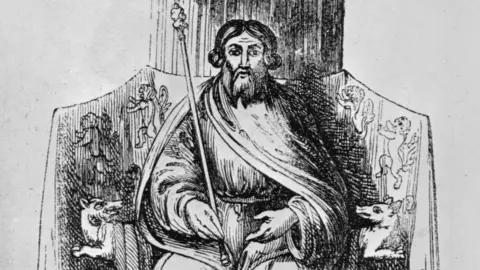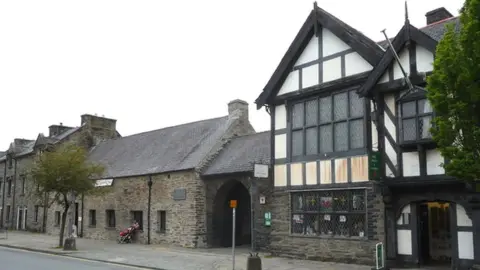Welsh Parliament: The crowning of Owain Glyndwr in Machynlleth
 Getty Images
Getty ImagesAs the National Assembly for Wales looks set to be renamed the Welsh Parliament, what of its predecessor 600 years ago?
Owain Glyndwr is said to have held a parliament at Machynlleth, Powys, during his rebellion against the rule of Henry IV in the early 15th Century.
Heir to the dynasty of Powys Fadog, he married into a leading family of the Welsh Marches (borderlands) and served in the English army.
The revolt began in 1400 when Henry IV appeared unwilling to mediate in a land dispute between Glyndwr and a neighbour.
A group of supporters proclaimed him Prince of Wales, and attacked English settlements in north east Wales.
Guerrilla tactics were met by punitive measures against the Welsh, which helped fuel support for Glyndwr from a people unhappy with English domination.
Backed by French military aid, the rebels took Carmarthen and Cardiff in 1403, followed by Harlech and Aberystwyth in 1404.
 Jeremy Bolwell
Jeremy BolwellThe parliament was held in Machynlleth that year, when Glyndwr was reputedly crowned Prince of Wales in the presence of envoys from France, Scotland and the Spanish kingdom of Castile.
However the tide turned against him as England's superior resources and weaponry were brought to bear under the leadership of Henry IV's son, the future Henry V.
After a string of defeats, Glyndwr went into hiding in the mountains and is though to have died in about 1416 at his daughter's home on the Herefordshire border.
He is commemorated by the Owain Glyndwr Centre, inside the Grade I-listed Parliament House, believed to have been built or restored in around 1460 on the site of his famous gathering.
However, Rhondda MP Chris Bryant has cast doubt on whether Glyndwr actually called a parliament at Machynlleth.
A historian of parliament as well as a member, Mr Bryant has said Adam of Usk was the only person from that era to have written about the event.
He said Adam claimed Glyndwr may have gathered a few barons but only pretended to call a parliament.
